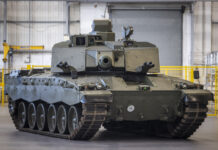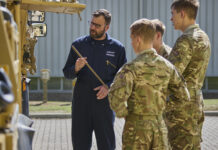A ‘lessons learned’ review of the British Army’s acquisition of the Ajax family of armoured reconnaissance vehicles has found “systemic and institutional” failures in the army’s procurement process.
Commissioned by UK Defence Secretary Ben Wallace in May 2022 and conducted by Clive Sheldon KC, the review was published on 15 June 2023. Rather than address the technical specifics of what was acknowledged as a ‘troubled’ programme after health and safety concerns were raised in 2021, the ‘lessons learned’ review instead focused on “how the MoD [Ministry of Defence] shares and elevates issues across the Department and the Front-line Commands, looking at systemic and process issues as well as individual action and inaction”.
One of the key findings of the review was a lack of appreciation of diverse and contrary voices, especially from those working on the ‘shopfloor’. “These voices were not fully included, and were too easily dismissed,” the review stated. “This led to individuals going outside of their chain of command to ensure that their voices were heard in the right places.”
The review also detailed a marked failure to escalate information about problems for situational awareness purposes. “I found that seniors would appreciate knowing, rather than being kept in the dark, about problems even if the risks were not clearly evidenced,” Sheldon stated. “They might have been able to provide advice or intervene to assist in resolving the problems. This was particularly the case with respect to the emerging concerns around noise and vibration. Not only was there a failure to escalate those concerns properly, but it took a considerable amount of time before anyone looked at the matter strategically and asked what was really going on.”
An obsession with not letting the programme’s schedule slip – which it ultimately did quite considerably – was another reason cited by Sheldon for exacerbating emerging problems. “I was also struck by the emphasis on keeping to time: that the Initial Operating Capability (IOC) date of July 2020 was ‘immovable’,” he stated. “Although there was a clear strategic rationale for meeting this date, the undue focus on that date had negative effects, creating pressure within the MoD and driving a number of unhelpful behaviours.”
Sheldon also found multiple areas of friction between the various constituent parts of the MoD acquisition process, for example in relations between the Defence Equipment & Support organisation (DE&S) as the delivery agent for the programme and the Defence Science and Technology Laboratory (dstl) as the agency providing scientific and technical expertise and advice to the MoD, as well as between DE&S and the Senior Responsible Owner (SRO): the army’s single point of contact for the Armoured Cavalry Programme.

“This friction was not caused by personalities,” said Sheldon, “but by the way in which the different entities saw their role on the project and how they viewed the roles of others.
Sheldon added that he perceived the relationship between DE&S and the vehicles’ manufacturer, General Dynamics UK (GDUK), “was not an easy one”.
Meanwhile, the report acknowledged the impact that the Covid-19 pandemic had on the programme. “The period from early 2020 to mid-2021 was critical for the programme,” it stated. “At the same time, normal processes were disrupted, and teams dislocated, as a consequence of the national lockdowns (in March to June 2020, November 2020, and January 2021) and subsequent gradual easing of restrictions. This disruption made it harder for the project team in Defence Equipment and Support to understand whether schedule delays were due to the restrictions or some other cause.”
The overall consequence of the pandemic’s effects were that normal opportunities for sharing situational awareness on the programme, such as through informal discussions on the margins of meetings or casual conversations in the office, were lost.
In terms of recommendations, the review made a total of 24, summarising them as follows: “four are aimed at improving the working relationship between DE&S and Dstl; five are aimed at improving the support and information provided to the SRO; five are aimed at improving the processes for holding to account and assurance; and eight are aimed at improving information flows and escalation”.
The original Ajax contract to design and demonstrate the Ajax vehicles was awarded to GDUK in 2010. This was followed by a production contract in 2014 that envisaged an IOC with the vehicles in July 2020 and a full operating capability (FOC) by December 2025. A so-called ‘recast’ of the programme to address the increasing divergence between the demonstration and manufacturing phases brought about contract changes in May 2019, under which IOC slipped to September 2021. However, by July 2021 no dates could be confidently forecast for either IOC or FOC.
Speaking to the House of Commons on 15 June, Minister for Defence Procurement James Cartlidge stated that 15 of the review’s recommendations had been accepted and nine ‘accepted in principle’.
“Ultimately at the core of our intent is to ensure the equipment we procure for the British armed forces is of the highest possible standard and, furthermore, that our service personnel have faith in the system and the taxpayer faith in the money we spend from the public purse,” Cartlidge stated. “Quite simply, we need to deliver change across the department, turning widespread desire for acquisition reform into tangible reality, in particular driving increased pace and agility into acquisition so that we are able to keep pace with technology and maintain our competitive edge.”
Reporting on the current state of the Ajax programme, Cartlidge stated, “I am able to confirm that, as of Tuesday afternoon [13 June], the Household Cavalry has been undergoing standard army field training on Salisbury Plain in a range of Ajax vehicles. Focused on individual and crew training, this step marks the restarting of British Army training on these sophisticated vehicles, and I hope underlines that this project really has turned the corner.”
Cartlidge noted that 44 Ajax vehicles have so far been delivered and that “General Dynamics’ personnel in Wales continue to run their production lines to build the fully operationally deployable vehicles – with the end goal of 589 fully operational vehicles by 2029”.
Peter Felstead











